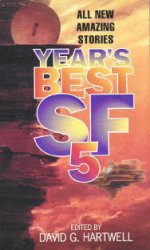
Year's Best SF 5
Edited by David G Hartwell
494 pages
This is a collection of the best sf stories written in 1999, according to David Hartwell. As such it's a disappointment. I don't know whether it's the general dearth of good sf stories in 1999 or just Hartwell's taste, but there are no outstanding stories here, few good stories and an awful lot of mediocre to bad stories. I'll list my thoughts on a few off the stories.
The biggest disappointment is Greg Egan's "Border Guards". Egan in recent years has an unfortunate tendency to preaching in his works, using his characters as mouthpieces for his philosophies. Here it completely overwhelmed the story, which started out fine with a typical Egan idea: quantum soccer. (Explanation on his website) After the appearance of a Mysterious Woman though it ends up as one of those "welcome to Utopia" dialogues talking about how stupid, hypocritical and silly anybody is who doesn't want immortality. Now I happen to agree with his position, but it ain't as black and white as shown here..
Brian Aldiss' contribution "An Apollo Asteroid" is confused, to put it politely. I'm ambivalent about Aldiss at the best of times: either his is a case of "the emperor's new clothes" or I'm just incapable of seeing what others find so good about him. This however is a story that makes no sense, has no point and is frankly boring. I wonder why it was published in the first place, other then it being Aldiss.
The Gene Wolfe story is a Lafferty pastiche, which is difficult to do without it ringing false. I think Wolfe succeeded for the most part.
"Democritus Violin", by G. David Nordley is a "let's make fun of modern academia" story which is too smug for its own good and stacks the deck in favour of its oh so rational heroine.
A self satisfied music teacher is shown up by creating a perfect copy of his Stradivarius using nanotech, but the student who did so wonders why she objected to the destruction of the "real" Stradivarius so vehemently if it doesn't differ from the copy at all... Anybody want to answer her?
Brian Stableford's "Ashes and Tombstones" is a good story on its own, but suffers a bit from being part of a series of stories set in a common history.
Fred Lerner's "Rosetta Stone" is a story about the discovery of an alien library on the Moon, but with the library containing only human books arranged according to alien sensibilities. This could be a novel or a long novella; as the story stands it now ends just when it's getting interesting. This is Lerner's first published story.
"Valour", by Chris Beckett is compared to William Tenn's "The Emancipation of Earth. What _was_ Hartwell thinking? This is probably the worst story in the book, a mix of prefab sci-fi background elements mixed with a superficially deep message, rehashed and regurgitated through and through.
Lucy Sussex's "The Queen of Erewhon" is a post collapse of modern society story set in New Zealand, near Samuel Butler's old ranch house Erewhon, (named after the classic dystopian tale) in fact. In it an anthropologist from the resurgent north of New Zealand visits the south island to observe a complicated court case and so learn more about the polyandrous culture of the south. Very effectively done, I'd like to see more of Lucy Sussex's stories.
Barry Malzberg proves with "Shiva" he can still write the same pointless stories he did in the seventies; 'nuff said.
Same goes for Mary Soon Lee's "Lifework": a pointless story with a whiny heroine is not my idea of fun.
The stories by Chris Lawson, Robert Reed, Robert Sawyer, Curt Wohleber and Tom Purdom are competent, if not particularly brilliant stories.
That's the general theme of this anthology I found: one or two good, but not excellent stories, a majority of workman like stories and a sizable minority of just bad or severely flawed stories. As a conclusion I'd say this is one "Year's Best SF" you can miss; a shame because the two before this were good solid anthologies. Let's hope Gardner Dozois' 1999 anthology is better.
